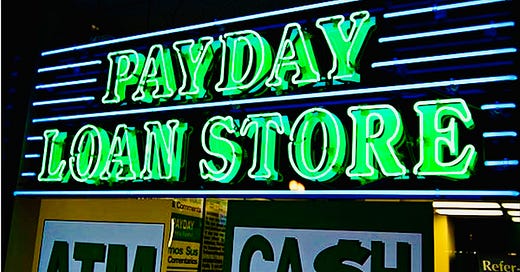Good bye, payday lending
Despite massive support for repeal, the General Assembly has previously refused to act.
For 15 years, advocates have sought to repeal a law that has allowed storefront payday lenders to charge usurious 260% interest rates to vulnerable Rhode Islanders. Despite massive support for repeal, the General Assembly has previously refused to act, primarily due to the efforts of industry lobbyists, including former Speaker of the House William Murphy1. Lobbyist Murphy has been paid $50,000 a year to schmooze General Assembly leadership so sleazy companies like Advance America can continue to siphon millions from vulnerable communities.
With the Governor’s signature, the Rhode Island Coalition for Predatory Lending Reform has finally closed the statutory loophole that has permitted the industry to target and ensnare cash-strapped Rhode Islanders — many of whom are consumers of color — in cycles of debt for years.
Payday loans drain around $3 million in fees a year from consumers and the local economy, and most of that money is sent out of state, mainly to one company located in South Carolina. No other New England state has a statute nearly as anti-consumer and pro-industry, with 93% of all payday lending fees a year in New England originating in Rhode Island.
All that changes when the new law goes into effect on Jan. 1, 2027.
Note, however, that payday loans are not the only kind of predatory lending currently offered in Rhode Island. There is the Rent-A-Bank scheme and Earned Wage Advances (EWA), for instance, and no doubt there are businesses across the country trying to figure out other ways to sell their loan-sharking under a thin veil of legality. Consumer protection is a moving target, and constant vigilance is required.
For a great explainer about predatory lending, see: Predatory lending practices continue to target low-income Rhode Islanders
From a Rhode Island General Assembly press release:
Legislation sponsored by Representative Karen Alzate and Senator Ana Quezada, which will repeal the exception allowing payday lending to operate in Rhode Island, has been signed into law.
“As Rhode Islanders struggle to make ends meet in an increasingly uncertain economy, one threat continues to fly under the radar while quietly wreaking havoc on our communities – payday lending. These predatory loan shops lure in the most vulnerable among us with what looks like a lifeline, but is in truth a trap. It’s time for our state to close this loophole once and for all,” said Representative Alzate (Democrat, District 60, Pawtucket, Central Falls).
“It’s taken a long time to end this predatory business model that exploits and victimizes our state’s most financially vulnerable residents. Under the guise of helping people with short-term financial relief, payday lending instead catches desperate individuals in almost inescapable cycles of ever-increasing debt. I’m grateful that this disgraceful practice will no longer be tolerated in Rhode Island,” said Senator Quezada (Democrat, District 2, Providence).
The legislation (2025-H5042A, 2025-S 0229A) eliminates the special carve-out in Rhode Island law that allows payday lenders to charge effective interest rates of 260% APR, trapping people in cycles of debt.
Rhode Island law already caps the maximum interest of small loans at 36% annual percentage rate for loans of $300 or less, with lower rates for larger loans. However, there are loopholes in this law that payday lenders use to charge far higher rates. The most common method is when storefront payday lenders register as deferred deposit providers, or “check cashers,” under the exemption in Rhode Island law that this bill will eliminate, allowing them to charge an effective APR of 260% on small loans.
Ending predatory payday lending practices has broad majority support across the political spectrum in Rhode Island. A 2022 poll by the Center for Responsible Lending showed that Rhode Islanders from all political parties supported a 36% rate cap on all loans by a 49-point margin. Better short-term loan options exist for Rhode Islanders, with local credit unions, banks, and community financial groups all offering small loans with low fees and interest rates ranging from 5% to 30%.






This is a good step forward (and about time!) but why are we waiting 18 months before the bill takes effect?
so much of the US economy is geared to helping business take advantage of low income and working people so it is good to celebrate when some progress is finally made. I think past failure to act on this is in part due to my ex-State Senator, apprently a friend of Murphy, who was able to block progress. He also blocked controls on assault weapons. But because he died, progress was possible on these issues, yet he is being lionized because he died.